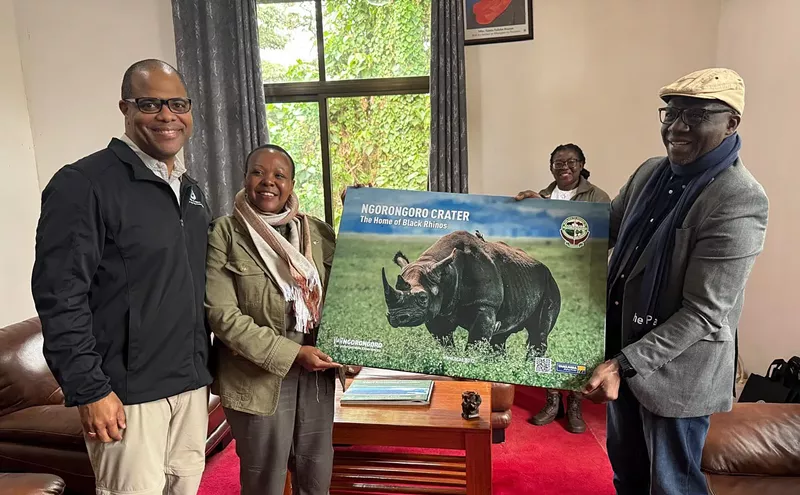You wake up one day, and the city's not white anymore.
First thing we have to say: You sure have been asleep a long time. This didn't just happen overnight. Must have been some party.
But then we have to ask: So what? Every insider in Dallas politics knows one thing: Someday soon, people are going to wake up and discover that the official face of Dallas County--Republican and white for so long--has turned Democrat and tan. The insiders wonder if this year's race for district attorney is the big moment.
Three white men in the March Republican primary. Three black men in the Democratic primary. Gotta go one way or the other. It does make a difference who is Dallas County DA. But does it make any difference what color he is?
You may think it makes no personal difference to you who gets elected. The district attorney prosecutes people for crime. Maybe you figure you don't do crime.
But what if you wreck your car after a party and get charged with manslaughter? Or some drunk runs into a member of your family? Or your brother-in-law calls with a crazy story about the cops grinding up pool-cue chalk to look like cocaine and planting it in his pickup truck?
That happened, remember. In 2001, Dallas police and the Dallas County DA sent innocent people to prison on drug charges that turned out to be completely trumped up. The fake-drugs scandal may be five years old, but the lesson is fresh: The fact that somebody wears a badge or has a title guarantees nothing.
Whose badge? Whose title? That's why we have elections.
So, sure, give us an honest DA who will put the bad guys away and not frame my brother-in-law. But which party do we vote for? Which color? The ballot finger falters.
Incumbent DA Bill Hill, a 63-year-old Republican in office since 1999, caught local politicians flat-footed when he announced late in the game that he wouldn't run again. Rumors were rampant. I was never able to run anything down, from Hill or anybody else, except that he had done his bit and was ready to move on. Whatever his motive, his departure set the scene for an already awkward campaign season.
We're still a month away from the March 7 primary, and pretty much everybody in the election is already trying to bounce the race issue around in weird, under-the-elbow, reverse-English triple rim shots that nobody except the politicians themselves could possibly ever understand.
Try to follow this. You'll need to get your crayons out.
A couple weeks ago, Republican candidate Judge Dan Wyde--color him white--started showing pictures of Democratic candidate Craig Watkins--color him black--to Republican voter groups (just wear out your white crayon).
Republican primary opponents Toby Shook and Vic Cunningham (white) denounced Wyde (white) for not so subtly pointing out Watkins' color (black), but Wyde (white) said he only wanted to warn Republican voters (white) that his opponents (white) will have trouble with Democratic voters (black, white, brown, tie-dyed).
Now look what a mess you've made! Clear your desks and try to keep up.
Maybe race is being used in such absurdly extraneous and nonsensical ways in this election because we've finally just worn it out. Maybe by the time we get to the November 7 general election we may actually be able to concentrate on who'd make the best DA.
The thing the insiders are focused on is The Great Demographic Wave. Ed Valentine, a Dallas political consultant who works for both Republicans and Democrats, sees a clear trend over the last six years toward a Democratic majority in Dallas County.
By looking closely at who really voted in the last three elections, Valentine says, he can come up with a pretty close count: "If I combine all three, without any duplication, the Republican households versus the Democrat households, then Democrats are leading by about 30,000."
That's big news in a DA's race where a total vote of about 400,000 can be anticipated. And it's not like we haven't already seen the wave in action. Two years ago it swept a lesbian Latina Democrat and total political cipher into the sheriff's office, defeating a way-back, wired-up, white-boy Republican.
Now the Democrats and the Republicans think anybody can win, depending on the wave. It's rub-a-dub-dub, three Republicans in one tub, three Democrats in another, all of them bobbing in the surf waiting to see which gets swept to shore first.
Normally I hate to write about Democrats and Republicans. I used to consider myself a Democrat. Now I look at local Democrats, and they seem like a bunch of nice people standing around waiting for the bus. Their platform is, "We want public office."
Absolutely. And hey. I want a bass boat. Should I run for office on that? "Hi. I'm delighted to be here this evening. My name is Jim Schutze. And I want a bass boat."
The Republicans are just as boring. Bulletin, bulletin, this just in--major breaking development: All of the Republican DA candidates have come out staunchly against crime! Republican fervor and excitement on this issue are so intense, a Martian watching from afar would be forced to conclude that Republicans, before this latest turn of events, must have supported crime.
Switch back to the Democrat tub, and all three candidates are saying the fake-drugs scandal shows we need more diversity in the DA's office. But the fake-drugs scandal was largely the creation of black leadership.
Pool-cue chalk was ground up and packaged into fake cocaine on the watch of the city's first black police chief, Terrell Bolton. Bolton defended the cops involved. Black leaders all defended Bolton. Groups like the local NAACP never lifted a finger to defend the victims, who were Mexican-American.
Craig Watkins, considered by many to be the leading Democratic contender, came within a little less than two and a half percentage points of defeating Hill in 2002, when the fake-drugs scandal was still a fresh hotfoot for Hill. But one reason Watkins failed to make it over the top may be that he refused to mention the fake-drugs scandal.
In the fake-drugs scandal, innocent people, many of them hard-working bootstraps immigrants who owned small businesses, were ripped out of their families and sent to State Rape Camp by local authorities. That's the kind of issue I used to think of as red meat for red-blooded Democrats.
When I interviewed Watkins recently, I asked him if he had avoided bringing up fake drugs during the 2002 campaign because he didn't want to embarrass then-Chief Bolton. He said absolutely not.
"I have wanted to run for DA since I was 16 years old," he told me. "I thought that I had a very good chance of winning, but I was being realistic. This race was a four-year race for me. And so I was really setting myself up for 2006 just in case I didn't win in 2002.
"In order to do that, I had to acclimate myself to some of those conservative voters to whom fake drugs was not an issue."
Yeah. OK. And I want a bass boat.
With the 2006 campaign under way, Watkins has adopted a moralistic stance on fake drugs. He still does not offer any blame for former Chief Bolton (black). But he's newly willing to be tougher on Hill, the incumbent DA (white). "When their ideology of the office is not about being fair and doing the right thing--it's more about making the numbers--that's what you get. You don't get quality justice."
Democratic primary candidate Larry Jarrett, a former Marine captain in the Judge Advocate General Corps and former assistant U.S attorney, has a similar line on fake drugs.
"Every defendant has to receive fair and moral treatment," Jarrett told me. "You can't be running cases through like a sausage factory."
B.D. Howard, the third Democrat in the upcoming primary, accuses the current regime in the DA's office of cultural narrowness and discriminatory practices.
"The Dallas Morning News had a story just a while back about how the district attorney's office still has the old way of excluding blacks from juries," Howard told me. "Why do blacks mistrust the system? I would ask the district attorney, 'What have you done to make blacks trust the system?'"
Yeah. Well. Normally I'd be the first sucker in line for that one. But that charge is based on stories in the Morning News that were transparently bogus (see accompanying story, "The DMN's Racism Geiger Counter").
So what about all this? And what if we did this radical thing instead: What if we thought about which candidate would make the best DA?
From my point of view they break down like this, in alphabetical order:
Vic Cunningham, Republican. Resigned a Dallas County criminal court judgeship to run for DA Former criminal prosecutor. Comes from a family with deep roots in local Republican circles. Wife is buddies with Laura Bush. Singled out for innovative sentencing and use of technology. Smart, tough, very conservative.
B.D. Howard, Democrat. Criminal defense lawyer. Way-back ties to conservative southern Dallas leadership. Enthusiastic about special "divert courts" designed to get first-time drug offenders out of the criminal system and into treatment. (By the way, so is Cunningham.) Howard speaks passionately about the need to get more of the minority community "invested in the criminal justice system."
Larry Jarrett, Democrat. Criminal defense lawyer, former assistant U.S. attorney, ex-Marine. Jarrett has been active in southern Dallas but doesn't have old ties there. He's bright, quick on his feet, probably the best-equipped of the Democrats to reach out and pick up white and Latino support.
Toby Shook, Republican. The current felony trial bureau chief under Hill. He's the county's star prosecutor. As a so-called "super-chief" under Hill, Shook has shouldered considerable management responsibility at the same time he's been in court winning against some of the nation's ablest defense lawyers. Shook is Bill Hill's anointed successor.
If the general election were a contest based strictly on prosecutorial acumen, it would probably be Shook versus Jarrett.
Craig Watkins, Democrat. Young, bright, personable, Watkins is the man with the heavy-duty Democratic party support and credentials, having come within 10,000 votes of beating Bill Hill last time around. He says southern Dallas is a fundamentally conservative culture that will flock to support law enforcement when it believes law enforcement is on its side.
Dan Wyde, Republican. Until recently a county criminal court judge, Wyde gets a certain rap from other Republicans for being too maverick. But, of them all, he's least prone to pander on crime-fighting, most candid about what the DA really needs to do to handle a huge caseload, like not accepting so many bad cases from the cops. Republicans listen to these ideas with furrowed brows, then stamp and clap when the others come out against crime.
Buried in here is a very important question: Which one of these candidates will bring the best combination of competence, toughness and fairness to the job? This time you have to look more closely, because the broad categorical imperatives of party and color are going to provide so little help.
Yeah, you might wake up and find the color of official Dallas has changed. But that alone will not tell you whether anything significant has taken place. And this is, after all, a significant job.
And moi? I told you. I want a bass boat.
When I interviewed B.D. Howard, a black Democratic candidate for district attorney, he offered a recent Dallas Morning News investigative series as evidence that the DA's office has been too white too long. In "Striking Differences," a series that ran last August, the News presented what it said was evidence of systematic racism in the way District Attorney Bill Hill's staff picks juries.
My problem is that I think the News series was deeply flawed in its approach, dishonest in its disclosures about reporting methods and wrong in its conclusions.
I've written about this before (September 1, 2005), and I hate to beat a dead horse. OK, I don't mind beating a dead horse. I like beating a dead horse.
The News stories said Hill's staff uses a system of racist subterfuge to keep black people off juries in Dallas County. One problem with that: Down deep in the story, the News' own numbers showed that the number of black people on juries in Dallas County is exactly what it should be.
But aha! The News said it had a special, semi-secret statistical device, sort of like a racism Geiger counter, which showed that the DA's staff was racist, even if the ultimate numbers came out OK sort of by accident, which was how the News characterized it. Believe it or not.
I have gone back and forth with people at the News about this series. Two weeks ago, the main author of the series, Steve McGonigle, an award-winning veteran investigative reporter, published an article defending the series in the IRE Journal, the official organ of the National Association of Investigative Reporters and Editors.
McGonigle made an astonishing claim: He said that, in the weeks before his series was published, Hill tried to use a criminal investigation of circulation fraud at the paper as a club to bully the News out of publishing the stories. "From our first interview with him, he linked our conversation with his investigation of the newspaper's circulation," McGonigle wrote in the IRE Journal.
In the last year, the Morning News, along with several other major daily newspapers around the country, has been the target of civil suits and government probes regarding circulation practices. Circulation is the number of readers and subscribers a newspaper claims to have.
At one point Hill was investigating whether the News' admitted overstatements of circulation amounted to a fraud against advertisers. That probe is generally believed to be closed, although some elements of it may have been folded into ongoing federal inquiries.
But let's pause and do a basic reality check here. We are asked to believe that the Dallas County district attorney walked into a room full of Morning News reporters and editors--with their tape recorder running on the table--and threatened to use an unrelated criminal probe as a hammer to quash a negative story about him.
Then we are asked to believe that the News never once mentioned this staggering act of official oppression to its readers. But it's coming out now in the pages of a trade journal?
"I may be dumb, but I'm not stupid," Hill told me. He said he assumed the News and its lawyers would have gone straight to the FBI if he really had pulled a stunt like this.
It just does not ring true.
I negotiated with the News all last week and was unable to get anybody there to talk to me about any of this on the record. So I can only come to one entirely personal conclusion: Nothing The Dallas Morning News has reported about racist practices by the current regime in the DA's office has credibility.
As far as those juries are concerned, the numbers to trust are the ones that show the ethnic makeup of juries in Dallas County almost exactly matching the makeup of the jury pool.
The race question in this race is perplexing. Yes, we may change from a long line of white DAs to a line of non-whites. That's something. But what?
Do we need a nonwhite district attorney because of the city's fake-drugs scandal a few years ago? Remember, though, that the scandal was carried out under a black police chief, whom black leaders defended.
The claim that Bill Hill's staff practiced racist jury exclusions is based on a transparently bad series of stories in The Dallas Morning News.
If I were still writing true crime, I'd say the race card in this election is a red herring. Instead, look for the one who reveres the law. --Jim Schutze












